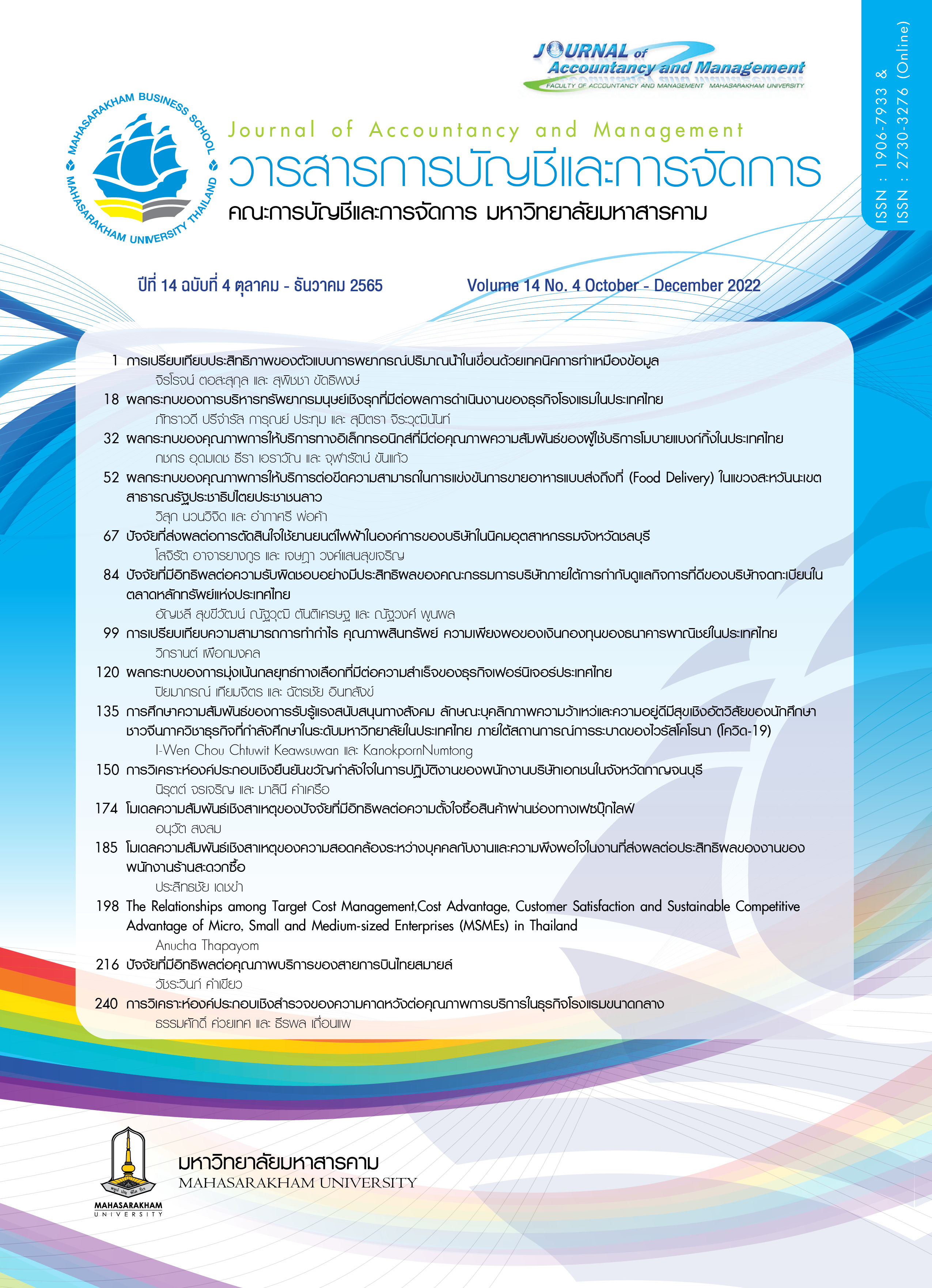Factors Influencing the Effective Responsibility of the Boards under the Good Corporate Governance of Thai Listed Firm
Main Article Content
Abstract
The objective of this research was to study the factors influencing the effective responsibility of the boards, which are one component of the effectiveness of corporate governance of listed companies in the Stock Exchange of Thailand. It consists of four factors, including top management support, MIS competency, competitive pressure, and regulation forces. The questionnaire was used as a tool to collect information from the executives of 143 firms listed on the Stock Exchange of Thailand. The statistics used for data analysis were Pearson's correlation coefficient and using multiple regression analysis to test the hypothesis. The results showed that MIS competency, competitive pressure, and regulation forces had a statisticallly significant positive influence on the effective responsibility of the boards of listed firms on the Stock Exchange of Thailand under good corporate governance. However, top management support had no effect on the effective responsibility of the boards of listed firms on the Stock Exchange of Thailand. Finally, the results of this research provide information on the ways to improve corporate governance effectiveness by improving the MIS competency, responding to competitive pressures, and complying with related regulations forces.
Downloads
Article Details

This work is licensed under a Creative Commons Attribution-NonCommercial-NoDerivatives 4.0 International License.
บทความที่ได้รับการตีพิมพ์เป็นลิขสิทธิ์ของวารสารการบัญชีและการจัดการ
ข้อความที่ปรากฏในบทความแต่ละเรื่องในวารสารวิชาการเล่มนี้เป็นความคิดเห็นส่วนตัวของผู้เขียนแต่ละท่านไม่เกี่ยวข้องกับมหาวิทยาลัยมหาสารคาม และคณาจารย์ท่านอื่นๆในมหาวิทยาลัยฯ แต่อย่างใด ความรับผิดชอบองค์ประกอบทั้งหมดของบทความแต่ละเรื่องเป็นของผู้เขียนแต่ละท่าน หากมีความผิดพลาดใดๆ ผู้เขียนแต่ละท่านจะรับผิดชอบบทความของตนเองแต่ผู้เดียว
References
ตลาดหลักทรัพย์แห่งประเทศไทย. (2561). รายชื่อบริษัทจดทะเบียนในตลาดหลักทรัพย์. ค้นเมื่อ 21 มกราคม 2561. จาก https://www.set.or.th
พจนารถ ฤทธิเดช ปาริชาติ บูรพาศิริวัฒน์ และมัทนชัย สุทธิพันธ์. (2564). อิทธิพลของผลตอบแทนผู้บริหารต่อผลการดำเนินงานทางการเงินของบริษัทที่จดทะเบียนในตลาดหลักทรัพย์แห่งประเทศไทย. วารสารคณะการบัญชีและการจัดการ, 13(2), 1–15.
สำนักงานคณะกรรมการกำกับหลักทรัพย์และตลาดหลักทรัพย์. (2563). การกำกับดูแลกิจการที่ดี. ค้นเมื่อ 21 ตุลาคม 2564. จาก https://www.sec.or.th
Aaker, D. A., Kumar, V., & Day, G. S. (2001). Marketing research. (7th ed.). In N. Y. J. W. & Sons. (Ed.), New York : John Wiley & Sons.
Abdul Wahab, N. S., Ntim, C. G., Mohd Adnan, M. M., & Tye, W. L. (2018). Top management team heterogeneity, governance changes and book-tax differences. Journal of International Accounting, Auditing and Taxation, 32(August), 30–46.
Andes, S. L., Nuzula, N. F., & Worokinasih, S. (2020). Competitive Advantage as Mediating Factor for Creating Firm Value: A Literature Review. BISNIS & BIROKRASI: Jurnal Ilmu Administrasi Dan Organisasi, 27(1).
Anjaria, K. (2022). Knowledge derivation from Likert scale using Z-numbers. Information Sciences, 590, 234–252.
Assunção, R. R., De Luca, M. M. M., & De Vasconcelos, A. C. (2017). Complexity and corporate governance: An analysis of companies listed on the BM&FBOVESPA. Revista Contabilidade e Financas, 28(74), 213–228.
Darma, J., Susanto, A., Mulyani, S., & Suprijadi, J. (2018). The role of top management support in the quality of financial accounting information systems. Journal of Applied Economic Sciences, 13(4), 1009–1020.
De Villiers, C. & Dimes, R. (2021). Determinants, mechanisms and consequences of corporate governance reporting: a research framework. Journal of Management and Governance, 25(1), 7–26.
Erna, H. (2020). Business Strategy, Corporate Governance and Sustainability Reporting:An Analysis of the Fit Contingency Approach. Journal of Asian Finance, Economics and Business, 7(12), 761–771.
Fatima, S., Ishtiaq, M., & Javed, A. (2020). Impact of accounting information system on corporate governance: evidence from Pakistani textile sector. International Journal of Law and Management, 63(4), 431–442.
Gutterman, A. S. (2011). Corporate Governance and Sustainability. Sustainability and Corporate Governance, 16(June), 1–14.
Hair, F., Hopkins, L., Georgia, M., & College, S. (2014). Partial least squares structural equation modeling ( PLS-SEM ) An emerging tool in business research. European Business Review, 26(2), 106–121.
Hitesh Shukla, & Nailesh Limbasiya. (2015). Board Effectiveness: An Evaluation based on Corporate Governance Score. Think India, 18(1), 16–23.
Kaufman, B. E. (2015). Market competition, HRM, and firm performance: The conventional paradigm critiqued and reformulated. Human Resource Management Review, 25(1), 107–125.
Kurzeja, J., & Novak, J. (2017). Corporate governance quality and a firm’s adaptation to competitive threats. Finance a Uver - Czech Journal of Economics and Finance, 67(1), 53–78.
Laoworapong, M., Supattarakul, S., & Swierczek, F. W. (2015). Corporate Governance , Board Effectiveness , and Performance of Thai Listed Firms. AU Journal Management, 13(1), 25–40.
Luciano, M. M., Nahrgang, J. D., & Shropshire, C. (2020). Strategic leadership systems: Viewing top management teams and boards of directors from a multiteam systems perspective. Academy of Management Review, 45(3), 675–701.
Mocanu, M. (2010). Corporate governance in the banking industry. Academy of Economic Studies Bucharest. 9(3), 379–402.
Nordberg, D. & Booth, R. (2019). Evaluating the effectiveness of corporate boards. Corporate Governance (Bingley), 19(2), 372–387.
Nunnally, J. C. (1978). Psychometric theory. New York : McGraw-Hill.
Pastor, C. K. (2020). The Role of Management Information System: Review on the Importance of Data and Implementation in Organizational Process. SSRN Electronic Journal, 2(2), 1–5.
Sarhan, A. A. & Ntim, C. G. (2018). Firm- and country-level antecedents of corporate governance compliance and disclosure in MENA countries. Managerial Auditing Journal, 33(6–7), 558–585.
Silapamahabandit, K. & Hensawang, S. (2020). The Relationship between Corporate Governance and Firm Value of Listed Companies on The Stock Exchange of Thailand in SET100 Index. Journal of Accountancy and Management, 9(4), 1–14.
Yermack, D. (2017). Corporate governance and blockchains. Review of Finance, 21(1), 7–31.
Yusliza, M. Y., Norazmi, N. A., Jabbour, C. J. C., Fernando, Y., Fawehinmi, O., & Seles, B. M. R. P. (2019). Top management commitment, corporate social responsibility and green human resource management: A Malaysian study. Benchmarking, 26(6), 2051–2078.


